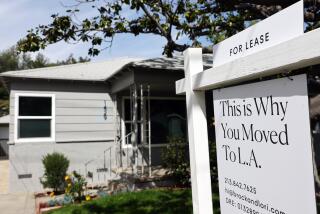Study Shows Most La Mirada Elderly Are Truly in Their Golden Years
LA MIRADA — If you’re 65 and live in this city, chances are you make no mortgage payments, still live with your spouse and have an annual income that is well above the county average for the Social Security set.
Furthermore, you’ve probably lived in La Mirada for two decades, want more public transportation and are satisfied with the quality of life in this bedroom community of 41,000.
Those are some of the conclusions contained in an 11-month study of La Mirada’s elderly, who are fast becoming a major component of the city’s demographic makeup.
City officials say the study, entitled “Aging in Suburbia,” will be the foundation for future decisions on how best to cope with the graying of La Mirada.
For the coming years, the study recommends more housing for the elderly, adult day-care facilities and extending local bus service into neighboring cities.
The city itself is relatively young, having incorporated in 1960.
But the vast majority who settled here have stayed put, producing a phenomenon called “aging in place,” according to Ray Young, an urban planner and chairman of the geography department at California State University, Fullerton, who conducted the La Mirada study. Young was hired last summer and paid $49,000 for his work.
In 1980, there were 2,200 city residents 65 or older, according to the U.S. Census. By last year, the number had grown to 3,660 or about 8.7% of the population.
And by the end of the century, Young predicts one out of every five La Mirada residents will be over 65.
The reason, Young said, “is the extremely strong attachment to home and community” in La Mirada. More than 55% of all residents have lived in the city for at least 15 years.
Among the elderly, the roots go even deeper, according to Young’s final report presented to the City Council at a study session Tuesday. As part of his research, Young interviewed 292 residents who were 55 or older. More than half said they have lived here for at least 22 years with the majority still residing in the homes they first purchased. And 85% of the respondents said they have no intention of moving.
“These are the people who built the community in the ‘60s and early ‘70s,” Young said. “They are the people who defined its character, and they want to finish their days here.”
But Young suggested that “it’s time to throw out the the stereotypes” of the doddering senior citizen, particularly in La Mirada.
Most Are Active
“Older suburbanites are neither impoverished, infirm nor reclusive,” he wrote in the report’s executive summary. “More apt characterizations are optimistic, healthy, active and . . . basically satisfied. . . .”
Elderly La Miradans are relatively well-off. The median household income for those 55 or older is $20,900, which is well above the county average of $14,666 and the state average of $14,340. It even tops neighboring Whittier, where the median income for its sizable elderly population is $16,096.
Self-esteem among La Mirada’s elderly is also high. One reason, Young said, is that they prefer euphemisms to the label senior citizen. Phrases like “maturing citizens,” “seasoned citizens,” “silver-haired years” and “golden girls” were far more acceptable to those interviewed by Young.
“It fits with their overall impression that life is generally good,” Young said. “The term senior citizen makes many feel old.”
One of the chief complaints among those surveyed was the city’s Dial-A-Ride bus system. Young said elderly La Miradans place a premium on access to shopping and friends. Yet many said Dial-A-Ride is too unreliable and operates only within the city limits, forcing them to either drive to malls in Whittier, Cerritos or Buena Park or shop at the La Mirada Mall. About 50% of the stores at the 85-acre La Mirada Mall are vacant and the center lacks a major department store.
Expansion Urged
Young urged the city to consider expanding Dial-A-Ride by linking it with transit systems in surrounding cities, like Whittier.
A step in that direction was taken last month when officials in Whittier and La Mirada established a transfer stop in south Whittier for passengers moving between bus lines.
Young also said the city must provide more adult day care and general home assistance for the elderly in the future. He said 75% of those surveyed pay $200 or less in monthly rent or house payments so they are content to remain in their homes. But a growing number, Young warned, may need day nurses or temporary care during periods of illness.
Across southeast Los Angeles County, Young said, there is a shortage of apartment-like housing for the infirm or low-income elderly, and La Mirada is no different.
Two Projects in Works
However, the city is working on two senior housing projects.
The city has spent $1.3 million to purchase the vacant First Baptist Church on La Mirada Boulevard. City Manager Gary Sloan said the city reached a tentative agreement in late June to sell the 4.5-acre site to a pair of developers, Love Real Estate Co. of St. Louis, Mo., and Brim and Associates in Portland, Ore. The two companies plan to build about 155 studio and one-bedroom apartments with 20% of the units to be set aside at a reduced rate for low-income elderly tenants.
The city has also applied for a $2.8-million construction grant from the U.S. Department of Housing and Urban Development to build a 50-unit senior housing complex on Valley View Avenue near Adoree Street.
While the demand for high-density housing is high is some areas, Young said many elderly La Miradans want to remain in their homes, which has prevented a younger generation from moving into the city. This trend, the professor said, may produce problems down the road.
“What happens when all those people reach their 80s and 90s and begin to die?” Young said. “Is there suddenly going to be a huge change in the character of this city? In suburbs like La Mirada, this is the great housing unknown of the future.”
More to Read
Sign up for Essential California
The most important California stories and recommendations in your inbox every morning.
You may occasionally receive promotional content from the Los Angeles Times.










